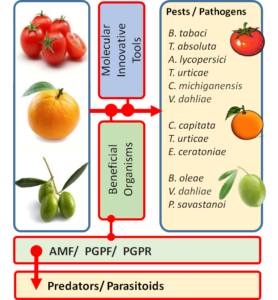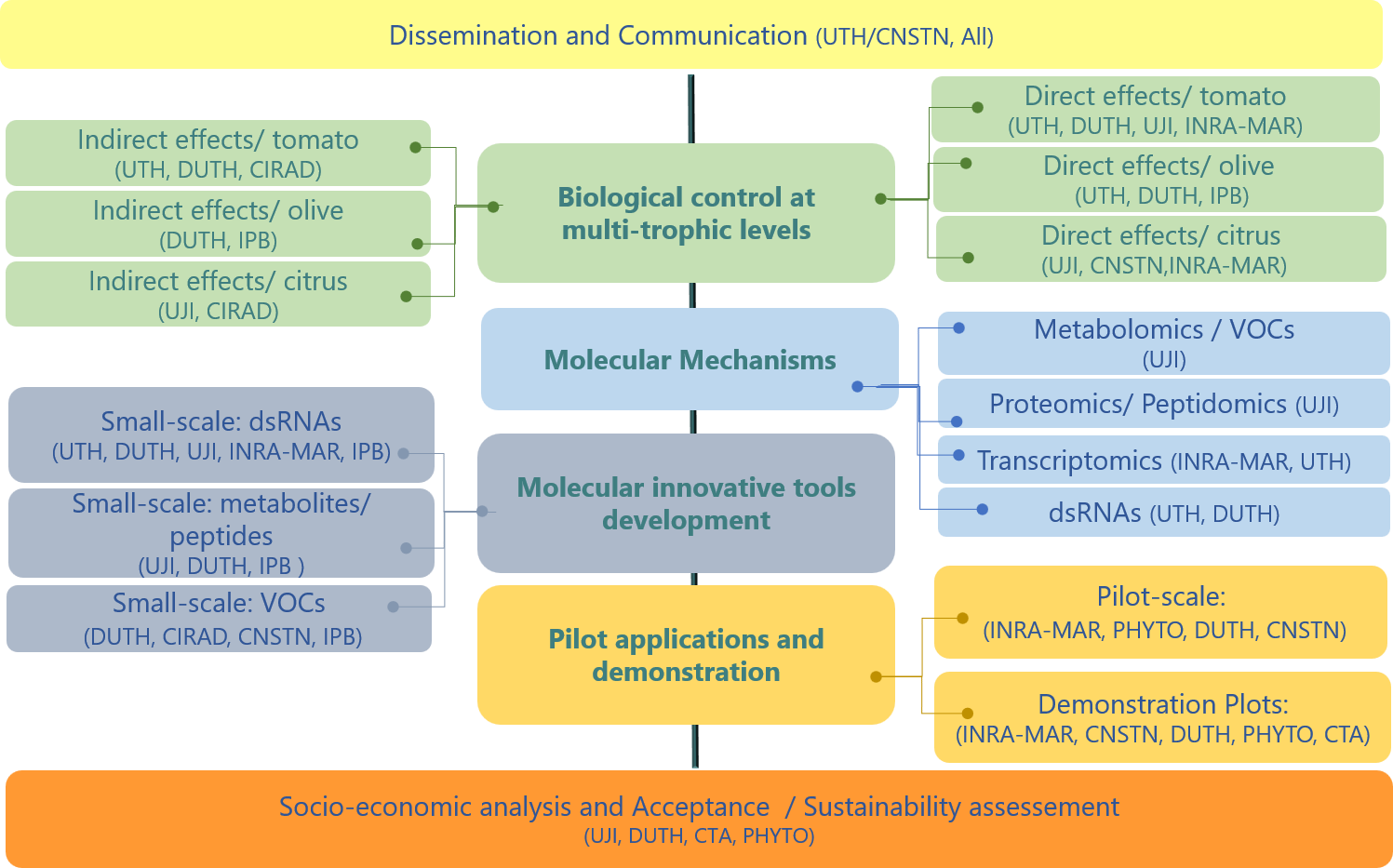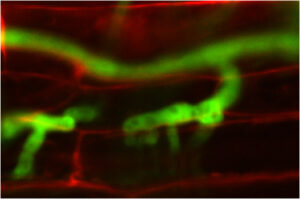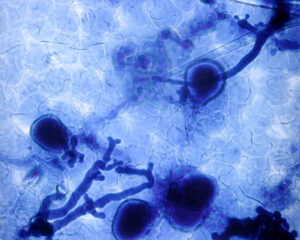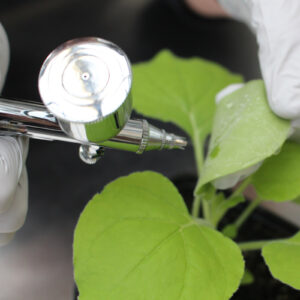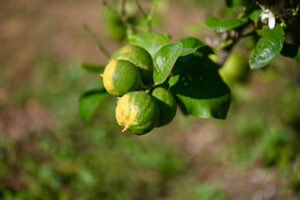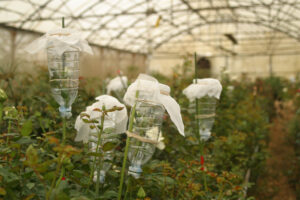INTOMED
INTOMED Research and Innovation Activities (RIA) primarily consist of activities aiming to establish new knowledge in the field of microbe-plant-arthropod interactions and explore the feasibility of new products/solutions/services for the sustainable control of pests in three major crops in the Meditterenean. INTOMED objectives and goals will produce new knowledge through scientific research that will be pursued with the collaborative research of the consortium partners from 3 Universities, 5 Research Institutes and one company.
INTOMED develops novel, effective and sustainable tools based on (a) widely-assessed interactions between plants and soil-borne beneficial microbes and (b) natural key plant (metabolites and peptides) and RNA molecules to enhance the resistance of economically important Mediterranean crops, i.e. tomato, olive and citrus, to major agricultural arthropod pests and pathogens. Soil-borne beneficial microbes have long been recognized for their ability to improve plant growth and nutrition and prime the plant immune system against pathogens and herbivores in plants. We will assess the potential of selected marketed and laboratory-owned strains of beneficial microbes, including endophytes, for their ability to improve crop resistance to arthropods and pathogens and study the molecular mechanisms involved in promising microbe-plant-pest combinations with the aim to identify plant secondary metabolites and peptides that mediate enhanced resistance and technically support future commercial biocontrol products. INTOMED also exploits the development of a GMO-free and effective pest control tool i.e. exogenous delivery of RNA molecules having the potential to trigger RNA interference (RNAi) against targeted pathogens/pests in both vegetables and fruit trees. Pilot demonstration trials, targeting end-users (farmers, SMEs) will assess promising beneficial microbes and plant molecules. In addition, INTOMED will increase public awareness of the nature of the proposed tools and analyse the impact of their acceptance. Our consortium includes 9 academic and industrial partners from Greece, Spain, France, Morocco, Portugal and Tunisia.
WP1. Project Management

WP2 Dissemination, Exploitation and Communication
WP2 objectives are:
- To develop and implement the plans for effective dissemination and exploitation of the project, its activities and results and the arising IP, employing a range of communication and dissemination tools;
- To raise public awareness and engage stakeholders in the project aims and results
- To coordinate communication activities with the scientific community and stakeholder networks and organizations and sectors of society through multiple activities and communication channels
- To ensure maximal exploitation of project results even after its lifetime and furnish recommendations for future developments
WP3 Biological control at multi-trophic levels
WP3 aims to determine the best combination of beneficial microbes for each of the crop plants of INTOMED to achieve plant protection under integrated pest/pathogen management schemes. The objectives to achieve this are:
- To study the effects of selected beneficial microbes (BM) against pests and pathogens of targeted crops with the aim to understand interactions among plants and their enemies (tri-partite interactions);
- To identify promising BM strains per INTOMED crop and pest/pathogen that directly affect biotic stressors;
- To study the BM-mediated interactions among plants and pests and their effects on organisms belonging to the third trophic level (i.e. predators/parasitoids – tri-trophic interactions);
- To identify promising BM strains per INTOMED crop and pest/pathogen that enhances biological control with natural enemies (predators, parasitoids).
WP4 Molecular Mechanisms
WP4 objectives are:
- To evaluate molecular and physiological processes behind plant defense priming triggered by BM against pests and diseases as a component of direct induced resistance;
- To idnetify volatile signals that regulate the indirect-induced defence triggered by BM against pests;
- To design and generate RNA molecules (dsRNAs/ siRNAs) as molecular biopesticides with gene-sequence specific action.
- To provide active compounds/peptides/molecules/dsRNAs to be evaluated for efficacy in WP5
WP5 Development of molecular innovative tool
In WP5 we will develop molecular innovative tools (MIT) as effective alternatives against pests/pathogens in small-scale plant growing conditions. The objectives are:
- To confirm the efficacy of metabolites and peptides identified in WP4 against pests and pathogens as well as on natural enemies’performance and efficiency;
- To test the isolated VOCs identified in WP4 on natural enemy performance and efficiency;
- To test the effect of dsRNAs/siRNAs (produced in WP4) against pests/pathogens;
- To select the most effective MIT to be used in larger-scale production schemes in WP6
WP6 Demonstration and pilot application
WP6 objectives are:
- To scale-up production and application of selected BM and MIT in the field;
- To evaluate selected BM and MIT to a second tier of application trials in the field;
- To demonstrate technical feasibility of the best performing beneficial microbes and MIT in pilot trials;
- To transfer technology to end-users.
WP7 Socio-economic analysis and acceptance
WP7 objectives are:
- To evaluate the current status and acceptance (by consumers, farmers and other actors) of pest control tools widely applied to control INTOMED arthropod pests and pathogens in olive, tomato and citrus in all INTOMED countries.
- To assess the economic impact of the proposed tools on end-users by gender: Farmers, consumers, SME.
- To propose gender-sensitive policies to incentivize the acceptability and use of the tools andl provide case studies comparing relevant opinions, intentions and attitudes between women and men.
- To provide a list of actions for rural development to show end-users the feasibility of INTOMED tools
The overall objective of INTOMED is to identify, develop, validate and promote effective and sustainable tools by (a) exploiting beneficial interactions between plants and soil-borne microbes and (b) identifying naturally derived key molecules (peptides, metabolites and RNAs) to enhance the resistance of economically important Mediterranean crops against major agricultural arthropod pests and pathogens, as well as by (c) assessing the social acceptability of the proposed tools by end-users.
The Specific Objectives (SO) of the project are the following:
1. Assessment of the potential of selected soil-borne beneficial microbes (BM) to induce resistance against pests and pathogens.
We will first perform a short screening of selected BM (marketed and laboratory owned, already tested and used in the consortium in previous research) under controlled conditions to identify optimal microbe-crop combinations that confer resistance and improve plant performance in response to arthropod/pathogen attack. Third-trophic level interactions of plants, pests and their natural enemies (predators and parasitoids) mediated by BM will be also studied. Best performing combinations will be later tested in pilot trials and field demonstration.
2. Understanding the mechanisms involved in microbe-induced resistance against arthropod pests and pathogens.
Mechanisms involved in beneficial microbe-plant-arthropod/pathogen interactions (tri-partite) interactions have only been scarcely addressed so far. Mechanisms mediating microbe-induced resistance against targeted pests and pathogens will be studied with the aim to understand beneficial interactions (as regards crop protection). In addition, as little is known about the effects of BM on the third trophic level (natural enemies), INTOMED will study how beneficial microbes alter plant phenotypes to attract specific natural enemies (predators/parasitoids) to the targeted crops (tri-trophic interactions).
3. Development of molecular innovative tools (MIT)- secondary metabolites/ peptides/RNA molecules.
Besides revealing the molecular pathways involved in promising interactions, this project will also result in the identification of secondary metabolites and peptides that mediate enhanced resistance to pests and pathogens to technically support future commercial products. In addition, plant metabolites (including volatile organic compounds (VOCs), peptides) with an impact on the behavior of natural enemies will be identified; hence, INTOMED will provide tools to increase ecosystem services provided by natural enemies. In addition, capitalizing on the extensive experience of consortium members in RNA interference (RNAi) mechanisms in plants, INTOMED will exploit the development of GMO-free and effective agricultural solutions such as the exogenous delivery of RNA molecules having the potential to trigger RNAi against targeted pathogens and pests. The above will be implemented under controlled conditions.
4. Assessment of the effectiveness of BM and MIT in small pilot scale to demonstrate technical feasibility and compatibility.
INTOMED aims to assess the efficacy of the best performing BM and innovative tools in small-scale trials in different study areas/sites in the Mediterrenean basin. The distribution of INTOMED consortium offers a great opportunity to perform multisite experimental trials, thus expanding the credibility of the proposed/developed pest control tools. Pilot demonstration trials will also involve SME that will perform applied research in, firstly, assessing selected BM in the greenhouse/field and, secondly, developing the MIT (peptides, metabolites) candidates in field trials. The putative additive effect and compatibility of selected BM and MIT application to the crops will also be evaluated.
5. Assessment of the socio-economic impact of the proposed tools- Increase of public awareness for more environmentally friendly plant protection tools.
INTOMED aims to understand the determinants of current situation (e.g. pest control methods and end-user perception of these) and to assess the socio-economic impact and acceptability of the proposed solutions in all INTOMED countries. Employment of beneficial microbes and molecular tools in agriculture may not be acceptable by consumers and farmers, and even raise concerns to the general public similar to those raised against transgenic plants and genetically modified organisms (GMOs). Thus, INTOMED aims to increase public awareness about the nature of the proposed tools and also analyze related impacts on the potent acceptance by end-users (consumers, farmers, agronomists).





